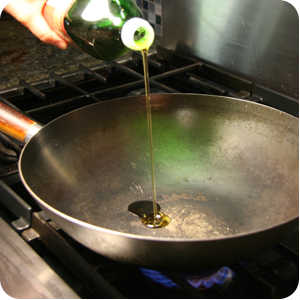Kitchen Tip (+ a Little Kitchen Wisdom)
At a recent Cooking Get Together we were preparing to saute onions for a healthy risotto. As always, the recipe said, “heat oil until hot but not smoking.” That directive led one of the participants to ask:

Q. When heating oil to saute, do you heat the pan first, then pour in the oil? Or pour in the oil then heat the pan?
A. The technically correct sequence is heat the pan first, then pour in the oil.
Q. But what if you forget? Is it ok if you mistakenly pour in the oil before heating the pan?
A. It is ok.
While that’s the short answer to the oil heating question, I have begun sensing a deeper side to questions like these.
The Rise of Fear-Based Cooking For example, did you feel a slight twinge of uneasiness when I just advocated a flagrant violation of “The Cooking Rules?” I did so because I have frequently made the “mistake” of pouring in the oil before heating the sauté pan, yet I’ve still ended up with a perfectly fine dish–and perfectly fine dishes are the sum total of what’s required of everyday cooks. However, for many everyday cooks, there seems to be an underlying uncertainty–maybe even a fear–about all the cooking rules floating around these days and whether we’re following them adequately. This is likely the result of the cooking shows and competitions proliferating on TV and elsewhere.
Of course there is nothing wrong with being informed and educated about cooking rules, as long as we maintain perspective. In other words, cooking rules do not define the line between good food and bad. Rather, they simply identify ways to make food taste better or bring out flavors more fully. We should never feel inadequate or cowed by rules that are oftentimes repeated with religious fervor.
Professional Cooks and Everyday Cooks Bear in mind that the cooking rules are developed and propounded by cooking professionals, i.e., people who are paid and have all day to produce the spectacular food. This does not accurately describe the everyday cook, who is throwing together meals after a long day of work, without any compensation, on a budget, around household chores and bill paying, with particular health needs, and maybe with kids underfoot or in between a variety of kid activities.
Permission to Relax I cooked for years without ever knowing proper saute technique–or much or any other technique for that matter, yet both family and friends were perfectly delighted with the results. This was before the days of cooking shows, so I think there was bliss in ignorance. What counted for more than anything was the care and attention I gave meal making. Gradually, I did begin to pick up pointers here and there as I could, and bit by bit my meals became better.
Think Guidelines, Not Rules I’d like to recommend this more relaxed approach to anyone who counts themselves in the “everyday cook” category. First, put your heart, care and attention into meal making. This counts for as much or more than anything. Then, think of cooking rules more in the vein of “guidelines. ” Instead of feeling stressed about knowing and following them perfectly all the time, just try to pick up one or two at a time and gradually incorporate them into your routines. You’ll find that few, if any, merit “end of the world” status, rendering a dish inedible if they are not followed. Following them simply adds up, bit by bit, to better and better meals.
Enjoy Finally, don’t let anything stand in the way of enjoying your food and those you share it with , which is the point of it all anyway, right?
More on the topic of cooking fear: Using Fresh Herbs at 11,000 Feet